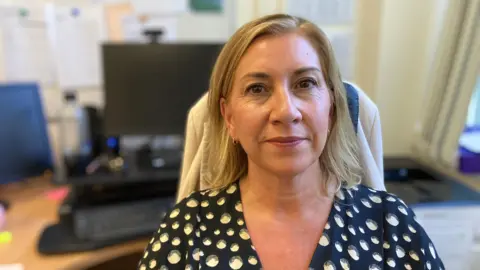Head bans smartphones in favour of 'brick' phones
 BBC
BBCA secondary school has banned smartphones for Year 7 to 11 pupils and will only allow basic "brick" phones from September.
Oxford Spires Academy's head teacher said the move would create a "calmer, more focused environment".
Several schools in the south of England are bringing in similar measures for younger pupils to prevent them from accessing the internet, apps or cameras.
The Department for Education said about 97% of schools were restricting phone use in some way, with many head teachers now exercising their right to implement complete bans.
From September, smartphones at Oxford Spires Academy will become prohibited items that must not be brought into school. If found, they will be confiscated and a parent or carer will be required to collect them.
Head teacher Louise Cowley said she had taken on board feedback from students, parents and staff about how addictive mobiles were.
"We recognise that student attention spans are becoming shorter, they are becoming disrupted by the need to want to check their phones and that's impacting lessons, and also how they're communicating and socialising with each other in school, as well as out of school," she said.
"So just bringing it in for Year 7 didn't feel right, it felt it needed to be a whole school recognition for this piece of technology not being conducive to positive learning habits."
Of those who responded to a parent survey, 70% said they were concerned about phone use with some reporting children were using them for more than five hours a day.
A total of 64% said they would support a smartphone restriction before Year 10 and 68% said they would buy a "brick" phone if peers did the same.
While some parents said they were concerned about their child travelling to and from school without a smartphone, Mrs Cowley said students would be supported with the transition and would be allowed to keep a basic phone in their bag as long as they were switched off and kept out of sight.
Max, 13, said too many pupils were using their phones in school.
"I've seen people play games and communicate on social media during classes and I think it's affecting their learning," he said.
Beatrix, 13, admitted feeling addicted to her phone and said it would take time to get used to the ban.
She added: "It will be quite unnerving to know my phone's not on me and it's at home."
Sixth formers will only be allowed to use a smartphone in their common room.
Talluah, 17, thinks the new policy will have a positive impact.
She said: "I think the policy is going to be really good regarding safeguarding for the younger year groups and regarding their mental health and how secure and comfortable they feel in school."
Other secondary schools introducing a smartphone ban for Year 7 pupils in September include: Wheatley Park and Chipping Norton schools in Oxfordshire; Swanmore College and Petersfield School in Hampshire; St Peter's Catholic School in Dorset and Bohunt School in Berkshire.
Eton College brought in basic phones for new pupils joining the school last September.

Some schools, including Aureas School in Didcot, have taken a different approach and have chosen to lock phones away in magnetic pouches during the day.
The Hurst School in Tadley, north Hampshire, was one of the first to introduce Yondr pouches in June 2021.
"Certainly the behaviour of our students is much improved... also even 18 months later our GCSE results went up by 2% against a backdrop of nationals coming down, and now four years later our progress has got 50% better and in fact we're still striving for more," said head teacher Jayne McLaren.
Mrs McLaren supports a move towards more basic phones, adding: "I feel young people need us to put those boundaries and parameters in... before they're overwhelmed with social media.
"You wouldn't hand your car keys over to a young person right now but that doesn't mean we don't want them to drive in the future."
'Bold steps'
Nearly 150,000 parents have signed a Parent Pact to hold off giving their child a smartphone until at least 14 and social media until 16.
The grassroots movement known as Smartphone Free Childhood took off in February 2024.
Its co-founder and director, Daisy Greenwell, said: "It's hugely encouraging to see more secondary schools taking bold steps to go smartphone-free.
"These devices – designed to be addictive – are having a real impact on young people's mental health, learning and relationships. Removing them from the school day is a crucial first step."
Ms Greenwell acknowledged schools could not do it alone, instead she said a cultural change was needed to normalise delaying giving smartphones to children.
Sleep, classroom behaviour, exercise, and how long was spent on phones overall were also found to be no different for pupils at schools with phone bans and those without, the researchers found.
However, University of Birmingham academics did find that spending longer on smartphones and social media in general was linked with worse results across all those areas.
The report's author, Dr Victoria Goodyear, concluded that school phone bans "in isolation are not enough to tackle the negative impacts".
A bill suggesting banning smartphones in schools and addictive algorithms aimed at young teenagers will be debated in parliament this July following widespread concerns.
A spokesperson from the Department for Education said: "Mobile phones are a distraction from learning and have no place in our classrooms, which is why our clear guidance sets out that school leaders should be restricting their use.
"Schools already have the power to ban phones, and we support head teachers to take the necessary steps to prevent disruption."
You can follow BBC Oxfordshire on Facebook, X (Twitter), or Instagram.
